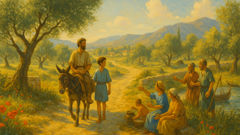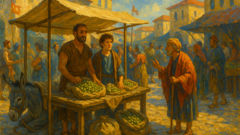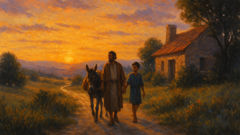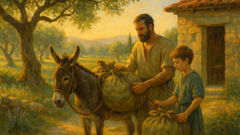Introduction
On the sun-bleached edge of an olive grove, where the cicadas sang their ancient chorus and the distant sea shimmered beneath a cloudless sky, life in the Greek countryside moved at the measured pace of the seasons. Here, nestled between wildflowers and low, weathered stone walls, lived Demetrios—a kindly, quiet man with eyes the color of olive leaves and hands worn by harvests. His home was a humble one, shaded by a fig tree and wreathed in rosemary. By his side, his son Nikolas, a spirited boy on the cusp of adolescence, chased after every adventure the hills had to offer, while their steadfast donkey, Thanos, plodded contentedly through each day. Together, they formed a small but unbreakable family, their lives intertwined with the rhythms of earth and sky. On a morning when the dew still clung to the grass and a breeze carried the faintest scent of the distant market, Demetrios prepared for a journey. He had promised to take a sack of olives—fat, green jewels from their own trees—to the great market in the next town. Nikolas would join him, eager for the excitement of barter, laughter, and the swirling colors of the market square. Thanos, their faithful donkey, would bear the olives on his back, as he had done so many times before. The journey to the market was not a long one, but it was filled with possibility: the winding path through the fields, the greetings of neighbors, the surprises that lay in every bend of the road. For Nikolas, it was a chance to see more of the world and learn from his father. For Demetrios, it was a reminder of the interconnectedness of their simple lives with the bustling life beyond their village. The sun rose higher, dappling the path in gold. With the olives bundled and Thanos’ harness fastened, the trio set out along the dusty road, unaware that their journey would become more than a simple errand. It would test their patience, challenge their choices, and teach them a lesson woven through generations—a lesson about the folly of trying to please everyone, and the quiet wisdom of trusting one’s own heart.
Setting Out: The Road of Possibilities
Demetrios led Thanos gently by the reins, with Nikolas at his side, chattering about the wonders he hoped to see at market. The path from their home meandered through fields of barley and poppies, past old olive trees whose twisted branches reached out like welcoming arms. Every step was accompanied by the soft crunch of earth beneath sandals and the occasional bray from Thanos, who seemed as content as any creature could be.

They had not traveled far before they encountered the first of many travelers—a group of women returning from the well, their clay jugs balanced gracefully atop their heads. One, an elder with a wise and weathered face, paused and shook her head at Demetrios. “Good man,” she called, “you walk beside your donkey while your son tires his young feet? Should not the boy ride and rest his legs for growth?”
Nikolas looked up hopefully, and Demetrios, ever mindful of kindness, helped his son onto Thanos’ back. The women smiled approvingly, offering blessings for their journey. The trio continued, now with Nikolas riding high, proud as a young prince atop his loyal steed.
Soon they passed a cluster of farmers mending a stone wall. Their eyes followed the small procession, and one called out, “How odd! The youth rides while his father, old and weary, trudges beside the beast. Should not respect for age grant the man a ride?”
Nikolas slid from Thanos’ back with a blush, offering the seat to his father. Demetrios climbed onto the donkey, waving a grateful hand. Thanos, accustomed to both burdens and affection, carried on dutifully. But as they rounded a bend where wild thyme scented the air, a pair of fishermen hauling their nets watched the scene with furrowed brows.
“Young man,” one fisherman said, “see how your father makes you walk in the dust while he rides in comfort? Is that the way of good fathers in your village?”
The question stung Nikolas, and Demetrios’ heart ached to see doubt cloud his son’s bright eyes. Without a word, Demetrios slipped from the donkey’s back. They walked in silence for a while, both on foot, leading Thanos together, each pondering the shifting judgments of those they met.
At the foot of a cypress-shaded hill, they came upon an old shepherd. He sat cross-legged by the roadside, chewing a blade of grass and watching the world with a half-smile. “I see neither of you rides,” he observed. “What is the point of owning a donkey if you don’t use him? Why let a beast go to waste?”
Demetrios and Nikolas exchanged a glance. The boy shrugged; the father sighed. In the spirit of compromise—and perhaps confusion—they both climbed onto Thanos’ back. The donkey, gentle and strong, did not complain, but his pace slowed a bit beneath their combined weight.
They continued through fields dotted with red anemones and along the edge of a stream where frogs croaked in the reeds. The road grew busier as they approached the outskirts of the market town. Villagers with baskets of produce passed them by, and merchants leading carts eyed them curiously.
It wasn’t long before a group of townsfolk gathered to whisper and point. One man stepped forward, scowling. “How cruel!” he exclaimed. “Two healthy people astride one poor beast! Have you no pity? You’ll break the donkey’s back before noon!”
Flushed with embarrassment, Demetrios and Nikolas slid off Thanos at once. They led him gently, each holding a rein, trying to shield him from further scrutiny. But the seed of uncertainty had taken root. No matter how they arranged themselves—father riding, son riding, both walking, both riding—someone always found fault.
As the town’s whitewashed houses came into view, Demetrios paused beneath the shade of a plane tree. He knelt before Nikolas and looked him in the eye. “My son,” he said quietly, “it seems that every soul we meet has a different idea of what’s right. If we listen to all, we’ll please none—not even ourselves.”
Nikolas nodded, the lesson settling gently upon him like sun on ripening fruit. Together they rose, choosing to walk beside Thanos into the market, each step now steady and certain.
The Market and the Mirror: Lessons Among Strangers
The market square of Therma was alive with color and commotion. Stalls overflowing with figs, woven baskets, and painted pottery lined the plaza, while the scent of grilled fish and warm bread mingled in the air. Children darted between vendors, laughter ringing out as merchants called their wares in voices weathered by sea winds.

Demetrios and Nikolas entered the square, their olives packed in neat sacks upon Thanos’ patient back. They found a spot beneath a fluttering awning, where shadows danced on the whitewashed wall behind them. The donkey was given water and a place to rest, though both father and son cast glances around, wary of more judgment.
No sooner had they begun to set out their wares than an old man with a silver beard paused, scrutinizing the arrangement. “Too many olives in one sack,” he remarked, “they’ll bruise before you sell them. Separate them for best price.”
Demetrios thanked him and began to redistribute the olives. A woman with an armful of dried herbs eyed their display critically. “You should stack them higher so buyers can see them from afar,” she insisted. A boy passing by chimed in, “No, no, keep them low—lest someone knock them over!”
The advice came in a torrent, each voice contradicting the last. A merchant from another stall scoffed at their prices, while a neighbor suggested they were too modest. An elderly matron scolded Nikolas for not shouting loudly enough to attract customers; a young girl giggled that his voice was too shrill.
Overwhelmed, Demetrios and Nikolas exchanged weary glances. The noise of the market became a storm around them—each well-meaning suggestion another gust of wind tugging them in a different direction. Even Thanos seemed to sense their unease, flicking his ears and shifting his weight beneath the awning’s shade.
As the sun climbed to its zenith, Demetrios found himself in front of a mirror stall—a gleaming wall of polished copper reflecting the world in shimmering fragments. He studied his reflection: tired eyes, dust on his tunic, a trace of frustration in his brow. Nikolas appeared beside him, fidgeting with a loose thread in his sleeve.
“Do you think we’ll ever get it right?” Nikolas asked, voice barely above a whisper. Demetrios placed a hand on his son’s shoulder. “Right for whom?” he replied softly. “For everyone out there? Or for ourselves?”
They returned to their stall, and this time, Demetrios made choices guided by his own sense of what was fair and wise. He arranged the olives as he saw fit, set a price he deemed honest, and encouraged Nikolas to call out with his natural voice—neither too loud nor too soft.
Gradually, customers came. Some grumbled, others smiled. A kindly old woman bought a bag of olives and praised their taste. A merchant haggled fiercely but left satisfied. By day’s end, most of their wares were gone, and Thanos’s burden was lightened.
Before leaving, a traveling storyteller approached. She wore a cloak of patchwork colors and eyes that seemed to hold every tale ever told. She listened as Demetrios described their journey—the shifting advice, the burden of pleasing all. She nodded knowingly and shared a story of her own: how even the gods themselves could not escape criticism from mortals.
“You cannot walk every path at once,” she said. “Better to travel one with honesty than many with doubt.”
As evening softened the edges of the town, Demetrios and Nikolas prepared for home. The lesson lingered in their hearts, richer than any coin earned in the square.
Returning Home: The Quiet Wisdom of the Hills
With the market’s din fading behind them and the last golden rays spilling across the fields, Demetrios, Nikolas, and Thanos began the trek home. Their pouches were lighter; so too were their hearts, though both bore the quiet weight of reflection. The road unwound before them, familiar yet subtly changed by all they had experienced.

They paused at a low stone wall where wild thyme and sage perfumed the evening air. Demetrios broke bread with Nikolas, sharing goat cheese and a handful of olives saved from their stall. Thanos nibbled sweet grass nearby, content in the gathering dusk.
Nikolas, legs stretched out in the grass, gazed up at the sky turning lavender. “Father, do you think we disappointed anyone today?” he asked. Demetrios smiled gently. “Perhaps we did, my son. But more important is whether we lived rightly by our own hearts.”
As the shadows deepened, they recalled each encounter—the well women’s concern for the boy, the farmers’ respect for age, the fishermen’s ideas of parental duty, the townsfolk’s pleas for mercy toward Thanos. Each piece of advice had been offered with conviction, yet each conflicted with the last.
Nikolas traced patterns in the dirt with a stick. “It’s like trying to walk in every direction at once,” he mused. Demetrios nodded. “If we try to please everyone, we end up pleasing no one—not even ourselves. Our lives must be lived with care for others, yes, but also with trust in our own judgment.”
The moon rose above the olive trees, silvering the path as they walked. In the distance, a nightingale began to sing, its melody drifting over the hills. The quiet wisdom of nature seemed to echo Demetrios’s words—steady, unwavering, content with its own song.
As their home came into sight, Nikolas felt a peace settle over him. The lesson of the day—so simple, so hard-earned—would guide him through many more journeys. And as they reached their gate beneath the fig tree, Demetrios placed a gentle hand on his son’s shoulder.
“Let the world speak as it will,” he said. “We can listen, we can learn, but in the end, we must walk our own path.”
In the shelter of home, surrounded by love and the enduring wisdom of ages past, they understood at last: to seek the approval of all is to lose oneself. But to act with kindness and conviction—that is enough.
Conclusion
From that day on, whenever Demetrios and Nikolas journeyed beyond their home, they carried with them not just olives or wares, but a quiet certainty. The voices of others, once overwhelming, became like the sounds of the countryside—present but not commanding. They learned to listen with respect, to weigh advice with discernment, and most of all, to honor the wisdom within their own hearts. The tale of their journey spread through the village and beyond. Neighbors who heard of their trials would smile knowingly and recount the story to their children by lamplight: how Demetrios and Nikolas tried to please all they met, and how each attempt led to new criticism. Over time, the fable grew roots, becoming a lesson shared from one generation to the next. And so, under the shade of olive trees and within the walls of humble homes, the wisdom endured: seek to live kindly and honestly, but never lose yourself chasing the ever-shifting winds of approval. In this way, the story of the man, the boy, and the donkey became more than just an account of a journey—it became a quiet anthem for anyone who has ever struggled to find their own path amidst the chorus of many voices.













